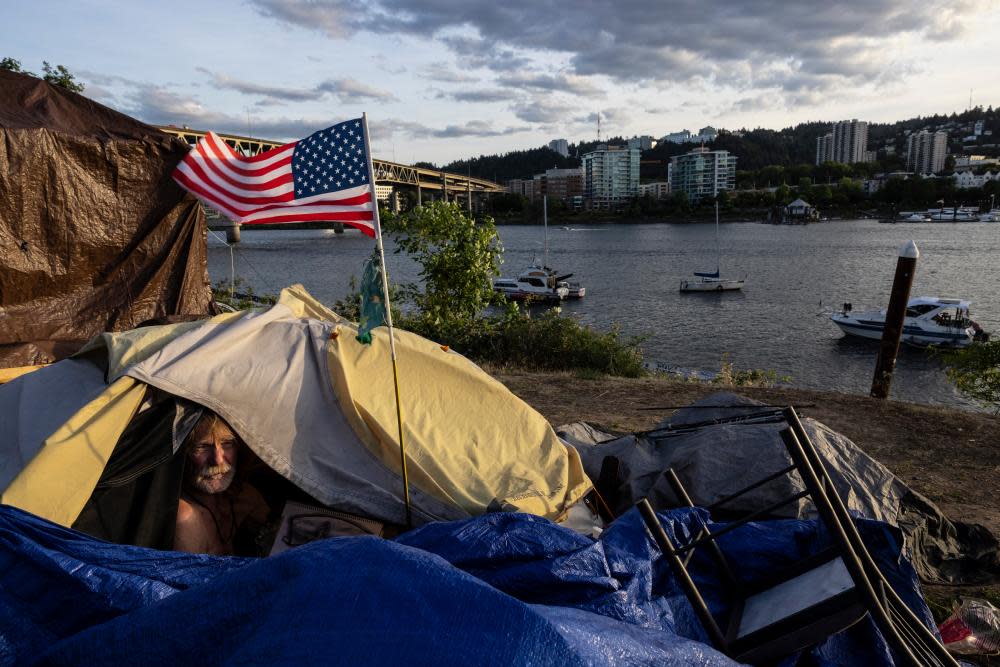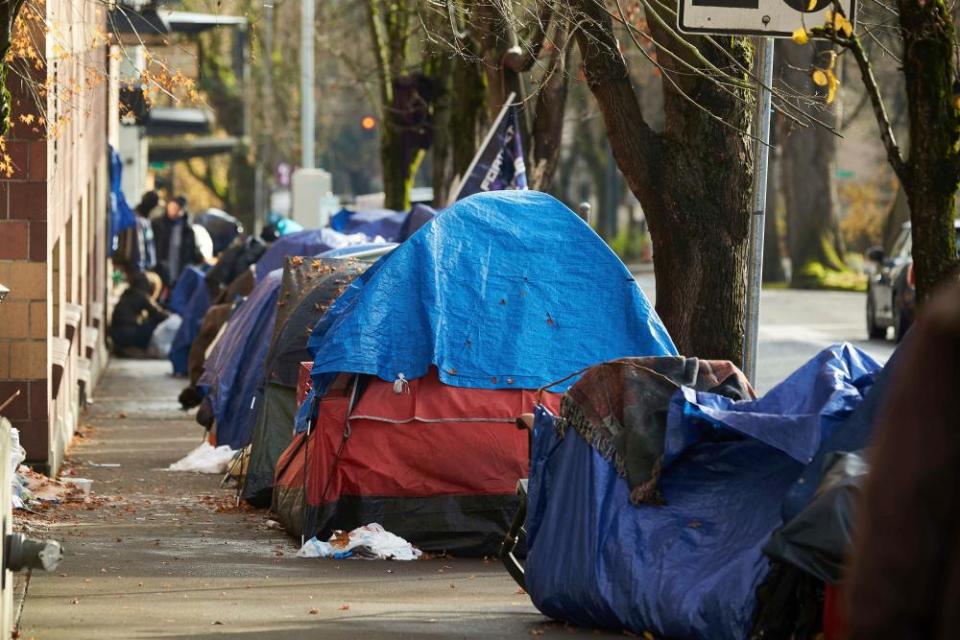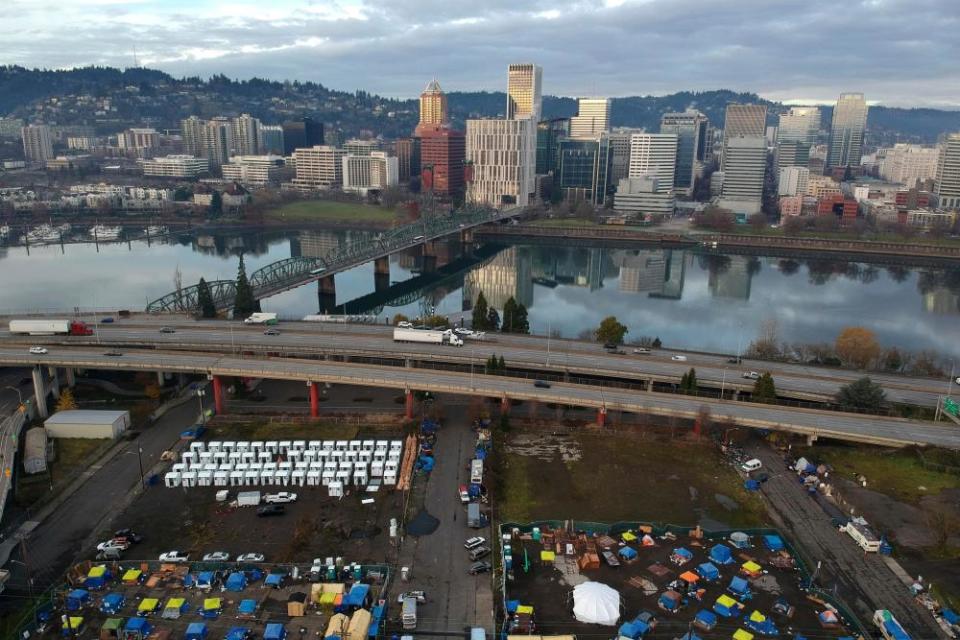‘Stick over carrot’: progressive Portland takes a hard turn on homelessness

- Oops!Something went wrong.Please try again later.
On a recent Monday, Jessie Burke stepped out of the lobby of the Society Hotel and into an unusual scene. The sprawling tent encampments that once lined the sidewalks of Portland’s Old Town were mostly gone.
“This is what should be normal,” said Burke, who bought and renovated the 132-year-old Mariners Building in 2013 and transformed it into the chic hotel on 3rd Avenue.
Related: Living in the Alaska rainforest with 1,000 bears: ‘Not the easiest place to be homeless’
Burke owes this to a palpable and controversial shift in liberal Portland, a city that had long opted for a mostly hands-off policy to the camps that had come to dominate the hotel’s surrounding blocks. Now, at the urging of residents like Burke, the city is clearing camps, sometimes daily, and planning to encourage unhoused people to relocate to centralized communities.
“The only policies I’ve seen are compassion on top of compassion,” Burke said. “Anyone who works with these populations knows there are people who respond to carrots and people who respond to sticks. Everyone who responds to carrots, good work; you got them. Most of the people that are left respond to enforcement.”
Advocates for unhoused people say they strongly disagree. This new “normal” in Old Town represents a distinct turning point in one of the country’s most progressive cities.
Unhoused Portlanders are feeling the increased pressure. Aistheta Gleason built themself a home of pallets when they first arrived in Portland from Colorado last summer. “I had a living room, a bedroom. It was all planned out,” they said. “I had a queen-sized bed and a water filter.”

Last fall the cops showed up, and Gleason says they were arrested for trespassing and resisting arrest, after a confrontation during which they initially refused to drop a walking stick. In the patrol car, they watched city workers dismantle the camp.
Now, they push their belongings, including at least two dozen books, around Old Town, where social services are close. Gleason doesn’t bother setting up a tent, knowing they’ll have to move it daily. Instead, they sleep with their dog in a different spot every night, wrapping up in a sleeping bag and a tarp.
The shift in city tactics is a product of changing political winds. Last fall, the Portland city commissioner Jo Ann Hardesty – who had for some residents come to represent a misguided and overly permissive approach to a homelessness epidemic – failed in her re-election attempt. Hardesty oversaw the Portland bureau of transportation, which is tasked with enforcing sidewalk ordinances that might prevent people from camping wherever they want. Hardesty ardently opposed enforcing those ordinances, as her constituency of unhoused people gained political power and legal clout.
Related: The US city where ‘desert palaces’ are sprouting as affordable homes dwindle
Hardesty’s loss came at the hands of a more “law-and-order” Democrat in Rene Gonzalez. His central argument, according to his campaign website: “Taking a hands-off approach to homelessness is not compassionate or progressive; it’s dangerous and inhumane.”
Gonzalez promised not only to work for increased shelter capacity and access to mental health and addiction services, but also to relocate illegally parked RVs and “clean up” parks and neighborhoods.
One of the commissioner’s first high-profile moves was to direct Portland fire and rescue, an agency he oversees, to stop handing out tents in the city. That move took effect just as a historic winter storm and a foot of snow walloped the region, and just after a new report that 2021 was the deadliest year of the last decade for homeless Portlanders, with 193 who died on the streets, of more than 5,200 known unhoused people.
Gonzalez’s election also came as the embattled mayor, Ted Wheeler, and other officials were hard at work on a new approach: both enforcing the ordinances that prevent people from “sleeping on sidewalks” and enabling the construction of a half-dozen “Safe Rest Villages” with space for up to 150 residents apiece.
The twin initiatives – a ban on tent camping on city streets and the village-building – are wildly unpopular among homeless advocates and the unhoused themselves, who insist that the sweeps do nothing but criminalize homelessness, traumatizing an already traumatized population. (A spokeperson for the mayor’s office did not respond to a request for comment.)
Other critics say the villages are a waste of resources better directed at the many underlying causes of the crisis, including the opioid crisis and housing shortages. Portland led the country in rent increases – prices rose by 39% – in 2021, according to Redfin.

“I appreciate the fact that we have to allow unfettered access to our sidewalks, certainly for people who are disabled,” said Scott Kerman, director of the homelessness non-profit Blanchet House, referencing a September lawsuit filed under the Americans with Disabilities Act, introduced by 10 Portlanders claiming the city is illegally allowing campers to block sidewalks. “But sweeps are at best a Band-Aid, and they often make things worse.”
In Portland, the sweeps haven’t been particularly effective at relocating people to safe, permanent homes. Only about 10% of Portlanders swept from encampments and offered shelter between April 2022 and February 2023 remain in temporary shelter. And fewer than 1% found permanent housing, according to data on 1,700 unhoused people released in February for Multnomah county, where Portland is located. The rest, presumably, remain outside.
“Sweeps just shuffle people from one place to the next,” said Monta Knudsen, executive director of the social services agency Bridges to Change. “A camping ban is just one more tool in the toolbox to make people uncomfortable. We’re just making homelessness more invisible again.”
Related: ‘It’s hell’: life under the American mobile home king who calls himself a ‘grave dancer’
The harsher policies being enacted now represent a turning point, welcome to some and alarming to others who say that it’s not necessary to pit houseless people against housed ones.
Angela Martin, executive director of the Portland non-profit HereTogether, said: “That the solution to homelessness is binary, a competition between two approaches, that’s what’s dooming our efforts.”
Andre Rochelle has been homeless for seven months, since his marriage deteriorated last year. After an overdose on some powder laced with fentanyl, Rochelle set up a “cozy, comfortable” tent beneath the Burnside Bridge. But he has to pack it up and move daily.
“Homelessness is illegal, period,” said Rochelle, 56. “They have the power to do it, so be it.”

